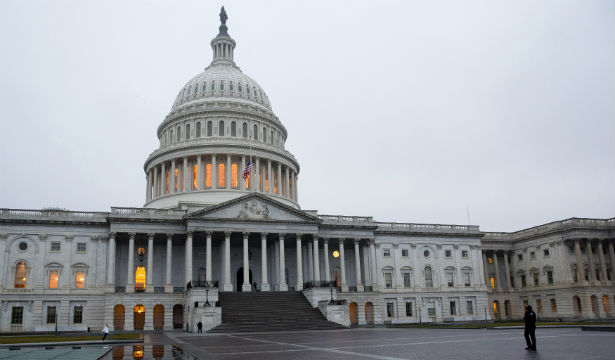How the Senate Filibuster Went Out-of-Control—and Who Can Rein It In
Don't look to the courts; elected leaders have to fix the problem themselves.

Federal Judges rarely play Santa Claus, and U.S. District Judge Emmet Sullivan declined to brighten the holiday for Senate Democrats. On December 21, Sullivan slapped down a lawsuit designed to cripple the Senate filibuster.
That would have offered the Senate's majority an easy way out of its agonizing dilemma. Instead, the senators and their leader, Harry Reid, will have to make and keep a tough New Year's resolution if they want to move any meaningful legislation during the next two years.
The case, Common Cause v. Biden, was a constitutional challenge to Senate rules allowing a minority of senators to prevent a vote, or even a debate, on any measure they disagree with. Only a "cloture" vote of 60 senators can move a filibustered measure forward.
The Common Cause lawsuit was an anachronism in 2012 -- a nostalgic evocation of the old days of public law litigation designed to open up frozen political institutions. The federal courts have become almost implacably hostile to this kind of reform lawsuit, and those who bring them know that their chances of victory are vanishingly slim. Whatever one may think of the filibuster, however, we can be glad this suit was dismissed; its cure for the filibuster would be worse than the disease.
The disease is, to be sure, really bad. Indeed, it begins to seem life-threatening, both to the Senate as an institution and to the political system it's part of. In dismissing the suit, Judge Sullivan did not heap praise on the practice of stalling legislation indefinitely. Indeed, he laid out in stark terms the appalling facts about filibuster abuse.
The number of actual or threatened filibusters has increased dramatically since 1970, and now dominates the business of the Senate. In 2009, there were a record 67 filibusters in the first half of the 111th Congress -- double the number that occurred in the entire 20-year period between 1950 and 1969.
By the time the 111th Congress adjourned in December 2010, the number of filibusters had swelled to 137 for the entire two-year term of the 111th Congress. During the 111th Congress, over 400 bills that had been passed by the House of Representatives -- many with broad bipartisan support -- died in the Senate without ever having been debated or voted on because of the inability to obtain the 60 votes required by Rule XXII.
These numbers ought to give anybody pause. The filibuster started life as a way to require the Senate majority to slow down; it has now become a way to make the entire Congress stop. What was once a rare and dramatic stopgap has now become a routine fact of legislative life. The filibuster against the Civil Rights Act of 1964, and the the heroic cloture vote that ended it, were high historical drama. The kind of filibuster we have today -- in which, for example, Senator Mitch McConnell introduced a bill and then immediately filibustered it to prevent it from passing -- barely qualifies as farce.
A legislative body that cannot bring itself even to vote on 400 bills really is not a legislative body at all -- it is a graveyard, where self-government staggers off to die.
If I think that, why am I glad the Judge Sullivan dismissed the Common Cause lawsuit? Simply because courts aren't suited to resolve every political problem. This question in particular is entrusted to the Senate itself by Article I, § 5, cl. 2 of the Constitution, which provides that "[e]ach House [of Congress] may determine the rules of its proceedings."
Nothing elsewhere in the text suggests that the courts should ride herd on those rules; and if federal judges begin disciplining Congress in this case, where would they stop? The Senate is, after all, the branch of Congress in which the Democrats hold a majority. Given the conservative dominance of the federal courts, I would think progressives would be hesitant about inviting Sam Alito and Nino Scalia to decide how the body shall operate.
The Democratic majority needs to handle this crisis itself, It can enforce filibuster reform through a rule change at the opening session January 3. These is an ongoing dispute about whether this would take 51 votes or 67 -- an unattainable super-majority. Pushing through reform with 51 votes -- or 50 votes plus Vice President Joe Biden -- has been called the "nuclear option" because it would represent a power play by the majority.
Senate Minority Leader Mitch McConnell recently warned that if Democrats pursue the "nuclear option" to impose limits on the filibuster, "the fighting, the bitterness, and the gridlock will only get worse." This is a bit like hearing the first mate say, "Sir, hitting a second iceberg might make Titanic sink faster." The last two years were a near-death experience for the Senate; another two like it and the body will have drowned in its own bile. Given the political facts of post-election America, McConnell's posture is a bluff, and should be called.
The real threat to filibuster reform is the hesitancy of some senior Democrats. They remember when their party used the filibuster -- to a much lesser extent -- to oppose judicial nominees named by George W. Bush. News reports suggest that, behind the scenes, these elders are warning that the day may come when Democrats are a minority and need filibusters to fight the Republicans.
The best answer is: to hell with that. Political leaders should not refuse to govern today because they are planning for their own defeat; if they do, they are beneath contempt.
The courts aren't coming to the rescue. If self-government is vindicated in the next two years, it will have to be done by those who ought to have done it all along: our elected leaders.